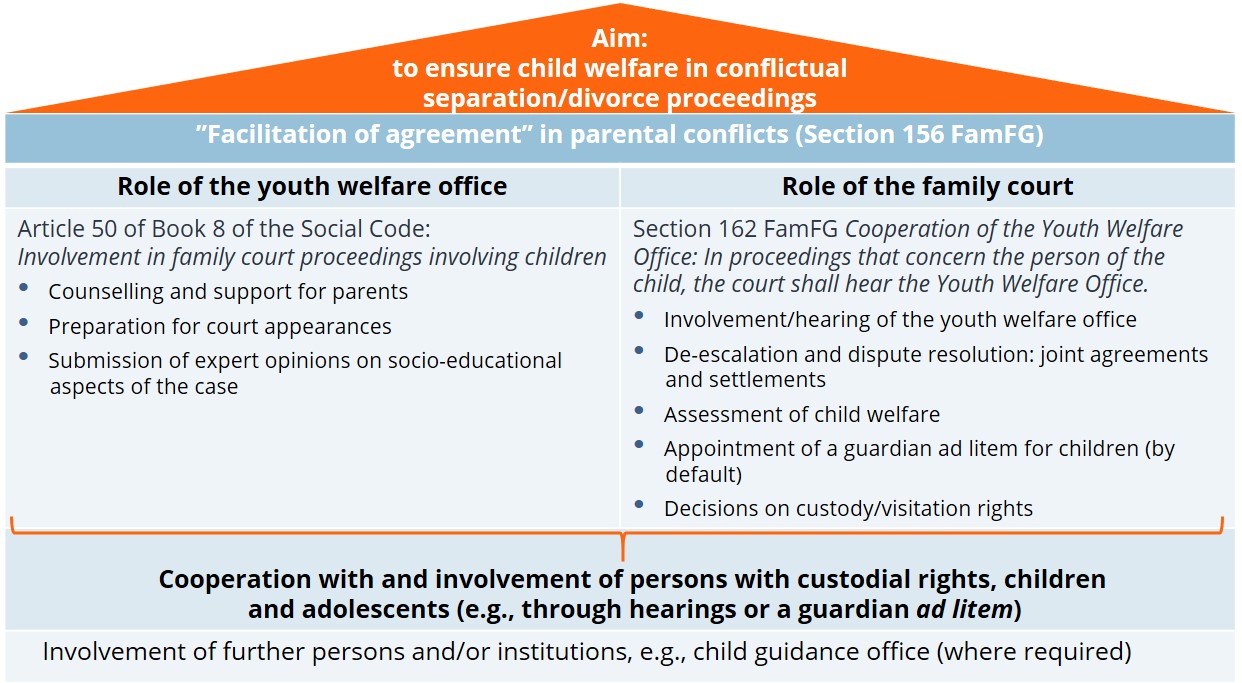Notes

69,626 married couples with 115,843 underage children got divorced in Germany in 2022. This is in addition to the number of unmarried couples who separated, on whom there is no statistical data (see Hammer, 2022).
As a rule, parents continue to share custody after separation (whether they are or were married or not). Ideally, the parents will jointly discuss how to share their parental rights and obligations and what their respective relationship with the child(-ren) will be. The youth welfare office can assist parents in this process, for instance by offering support under Article 17 (relationship counselling, counselling in situations involving separation or divorce between parents of underage children) or Article 18 of Book 8 of the Social Code (SGB VIII) (counselling and support in caring for children and in matters involving visitation rights). Parents can choose to make use of these services. In offering them, the youth welfare office seeks to encourage cooperation between separated parents when it comes to negotiating parental responsibilities.
The involvement of the youth welfare office in family court matters, a sovereign task, is closely related to the child and youth services referred to as “promotion of care and upbringing in the family” (see also Promotion of care and upbringing in the family). Custody conflicts may have to be brought before a court, for instance when a parent petitions the family court for a change or an order concerning custody or visitation rights. The youth welfare office is obliged to cooperate in such proceedings. The Act on Proceedings in Family Matters (FamG) stipulates that “in proceedings that concern the person of the child, the court shall hear the Youth Welfare Office. This is the case in approx. 5% to 15% of all divorces (Hammer, 2022, p. 12).
If the hearing does not take place solely because of imminent danger, it shall be held as soon as possible thereafter” (Section 162 [1]). Under Article 50 (1) of Book 8 of the Social Code, the youth welfare office is obliged to cooperate and to assist the court in all proceedings concerning custody of children and adolescents. Primarily, it supports the families in finding a consensual solution to parental conflicts. For instance, it may encourage the parents (again) to make use of counselling and support under Articles 17 and 18 of Book 8.
The youth welfare office notifies the family court of any services already offered and provided, as well as of any further support that may be provided to the family in question. Through their socio-educational expertise, its representatives assist and support the family court in arriving at a decision. Their expert opinions describe, e.g., the social and emotional development of the children and adolescents, evaluate relationships and ties to parents and siblings, and give voice to the preferences and wishes of the children or adolescents. As a rule, family court proceedings involving separation and divorce are centred around finding consensual solutions (Section 156 of the FamG refers to this as “Facilitation of Agreement”). Parents who are unable to arrive at a resolution by themselves can avail themselves of counselling and mediation so they can come to an agreement over parental custody. Should parents be unwilling to accept such support, the family court may order them to attend a counselling or free mediation session.
Section 155 of the FamG (“Principles of Priority and Expediting Proceedings”) requires that an early hearing be scheduled, at the latest within one month of commencement of proceedings, during which all participants come together to discuss the situation and assess the parties’ willingness and ability to cooperate. Possible next steps are discussed and ideally milestones agreed. Should this not be possible, the judge may issue an interlocutory order prior to commencement of the main proceedings, when more information is gathered and a final judgment is handed down.
Further reading
- Hammer, Wolfgang (2022): Familienrecht in Deutschland – eine Bestandsaufnahme (last accessed: 31 July 2023).
- Meysen, Thomas/Nonninger, Sybille (2019): Familienrecht und familiengerichtliches Verfahren (FamFG). In: Merchel, Joachim (ed.): Handbuch Allgemeiner Sozialer Dienst. 3rd edition, Munich, p. 126−136.



